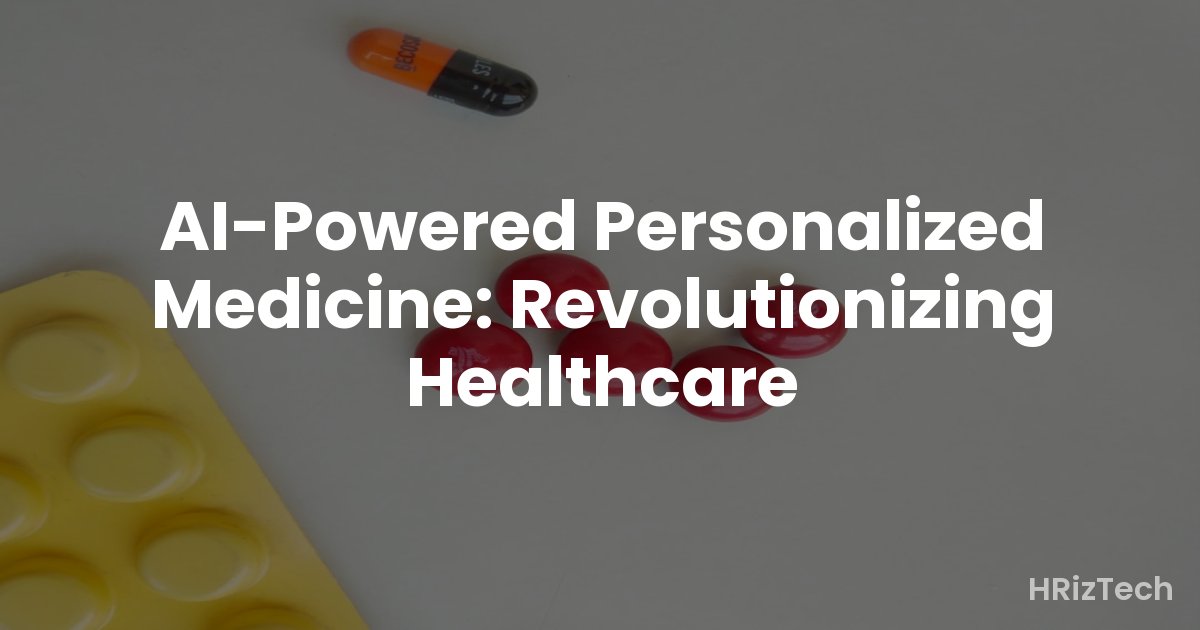AI-Powered Personalized Medicine: Revolutionizing Healthcare

AI-Powered Personalized Medicine: Revolutionizing Healthcare
- AI is rapidly transforming healthcare, leading to more precise and effective treatments.
- Personalized medicine tailors treatments to individual patients based on their unique genetic makeup and lifestyle.
- AI algorithms analyze vast datasets to identify patterns and predict disease risks, enabling proactive interventions.
- Challenges remain, including data privacy concerns, algorithm bias, and the need for wider accessibility.
- The future of healthcare hinges on responsible AI integration, ensuring equitable access to these advancements.
The Dawn of Personalized Healthcare
For decades, healthcare has largely followed a "one-size-fits-all" approach. The same medication, the same treatment plan, often applied to everyone with a similar diagnosis. But what if your body reacted differently to a drug than someone else's? What if your genetic predisposition made you more susceptible to certain side effects? This is where the revolutionary power of AI-powered personalized medicine steps in. It's a paradigm shift, moving away from generic treatments toward therapies meticulously tailored to the individual.
How AI Fuels Precision
The magic, or rather, the sophisticated science, lies in AI's ability to analyze colossal amounts of data. We're talking genomic data, medical history, lifestyle factors, environmental influences – the works. AI algorithms, particularly machine learning models, can sift through this data, identifying intricate patterns invisible to the human eye. This allows for:
Predictive Diagnostics:
AI can predict the likelihood of developing certain diseases based on an individual's genetic profile and lifestyle. This proactive approach enables early interventions, potentially preventing the onset of serious illnesses or catching them at a much earlier, more treatable stage. Imagine receiving personalized risk assessments for heart disease, cancer, or Alzheimer's years before any symptoms appear!
Drug Discovery and Development:
The pharmaceutical industry is leveraging AI to accelerate drug discovery and development. AI algorithms can analyze vast chemical libraries, predicting which molecules are most likely to be effective against specific diseases and minimizing the time and cost associated with traditional drug development. This means faster access to life-saving medications.
Treatment Optimization:
AI can help optimize treatment plans for individual patients. By analyzing a patient's response to different therapies, AI can suggest adjustments that improve efficacy and minimize side effects. This is particularly crucial in areas like oncology, where treatment choices are complex and the potential for adverse reactions is significant.
Improved Diagnostics:
AI is already enhancing the accuracy and speed of diagnostic imaging. Algorithms can analyze medical images (X-rays, CT scans, MRIs) with remarkable precision, identifying subtle anomalies that might be missed by the human eye. This leads to earlier and more accurate diagnoses, improving patient outcomes.
Challenges and Ethical Considerations
While the potential benefits of AI-powered personalized medicine are immense, we must acknowledge the challenges. Data privacy is a paramount concern. Protecting sensitive patient information is crucial, requiring robust security measures and ethical guidelines. Algorithm bias is another significant issue. If the data used to train AI models is not representative of the population, the resulting algorithms may perpetuate existing health disparities.
Accessibility is also a critical consideration. The high cost of genomic sequencing and AI-driven analysis could exacerbate existing health inequalities, potentially leaving vulnerable populations behind. Ensuring equitable access to these advancements is crucial for realizing the full potential of personalized medicine.
The Future of Healthcare
AI-powered personalized medicine is not just a futuristic concept; it's rapidly becoming a reality. We are already seeing its impact in various areas of healthcare, and the pace of innovation is accelerating. However, responsible implementation is paramount. We need robust regulatory frameworks, ethical guidelines, and a commitment to inclusivity to ensure that these powerful technologies benefit all members of society, not just a select few. The future of healthcare hinges on our ability to leverage AI responsibly and ethically, driving us towards a healthier, more equitable world.
Key Takeaways
- AI is revolutionizing healthcare with personalized medicine.
- Personalized medicine uses AI to tailor treatments to individuals.
- AI improves diagnostics, drug discovery, and treatment optimization.
- Challenges include data privacy, algorithm bias, and accessibility.
- Responsible AI integration is crucial for equitable access to advancements.
Looking Ahead
The journey toward truly personalized medicine is ongoing, but the potential is undeniable. From preventing diseases before they even manifest to delivering highly targeted and effective treatments, AI is poised to reshape the healthcare landscape profoundly. The ethical considerations and challenges are significant, but by working collaboratively and thoughtfully, we can harness the power of AI to create a healthier and more equitable future for all.
What are your thoughts on the ethical considerations surrounding AI in healthcare? Share your opinions in the comments below!
#AI #Healthcare #PersonalizedMedicine #HealthTech #ArtificialIntelligence]
Comments
No comments yet. Be the first to comment!